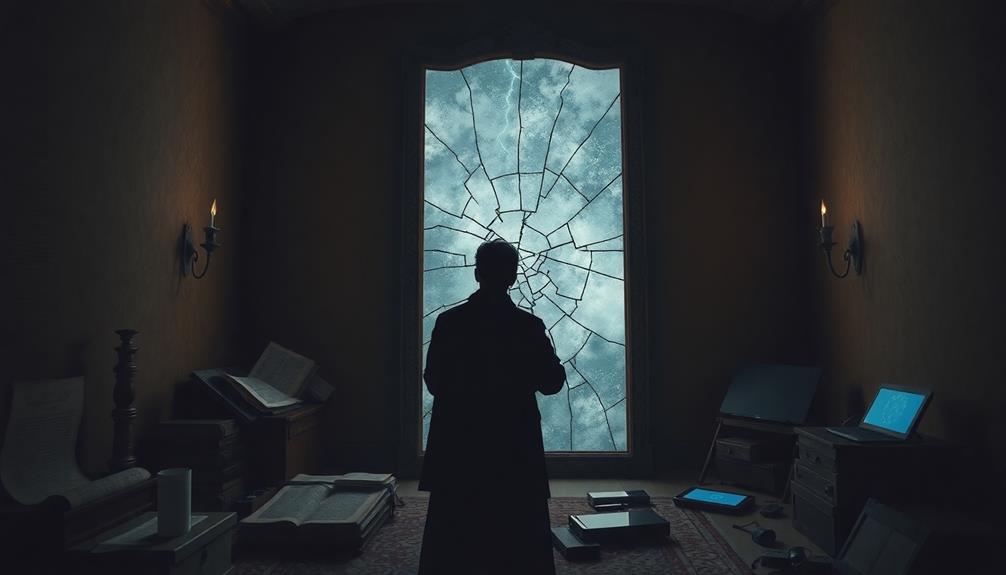You can't always trust your senses, as ancient skeptics like Pyrrho and Carneades demonstrated. They taught that perception is often limited and shaped by beliefs, leading to misinterpretations of reality. Our senses only capture a fraction of what's out there, and cognitive biases can skew how we interpret information. Illusions and magic tricks show just how unreliable sensory experiences can be. While some philosophers advocated basic trust in our senses, they also recognized the uncertainty that comes with it. If you're curious about how these lessons apply to today's understanding of perception, you might just find more insights ahead.
Key Takeaways
- Ancient skepticism, as taught by thinkers like Pyrrho and Carneades, encourages questioning the reliability of sensory experiences and beliefs.
- Optical illusions and cognitive biases demonstrate how our senses can misinterpret reality, leading to distorted perceptions of the world.
- Inattentional blindness and magic tricks reveal that focusing on specific tasks can cause us to overlook critical details in our environment.
- Sextus Empiricus highlighted the need to critically evaluate sensory experiences, emphasizing their limitations in establishing valid knowledge.
- Cultural beliefs and individual biases influence perceptions, necessitating a continuous examination of our sensory experiences for a clearer understanding of reality.
The Nature of Perception

Perception shapes how you experience the world, but it's inherently limited. Your senses can only detect a small portion of the electromagnetic spectrum, meaning you miss out on much of what exists in reality. This limitation prompts skepticism about what you can truly trust.
For instance, optical illusions reveal how the human mind often misinterprets sensory information, showing that what you see isn't always an accurate reflection of reality. Additionally, cultural beliefs, such as those related to star appeal in astrology, can influence how you perceive attractiveness, which adds another layer of complexity to perception.
Cognitive biases further complicate this picture, distorting your interpretations and highlighting that your understanding of the world is constructed rather than directly observed. The brain has a tendency to fill in gaps in sensory input, prioritizing survival over accuracy. This can lead to significant misinterpretations, especially in critical situations where clarity is essential.
As you navigate your experiences, it's crucial to maintain a healthy skepticism regarding your perception. Recognizing that your senses can deceive you encourages a deeper inquiry into what you believe and understand.
Trusting your senses is a natural inclination, but awareness of their limitations fosters a more nuanced view of reality, empowering you to seek a more accurate understanding of the world around you.
Historical Skepticism Perspectives

Skepticism, as a philosophical tradition, invites you to question the very foundations of your beliefs and knowledge. In ancient times, particularly during the Hellenistic period, thinkers like Pyrrho and Carneades emphasized inquiry and the importance of suspending judgment instead of affirming beliefs. They believed that our senses often mislead us, prompting you to evaluate the nature of perception and the criteria for truth.
The Greek term "doxa," which means both belief and opinion, highlights this skeptical approach, encouraging you to examine the impressions that shape your understanding. Figures like Sextus Empiricus critiqued earlier philosophies, challenging the reliability of sensory experiences and the validity of knowledge claims.
This inquiry reflects Socratic wisdom, where recognizing your own ignorance becomes a pathway to deeper understanding. While skeptics face the Apraxia Charge, which argues that a life without beliefs leads to inaction, they maintain that decisions can still be guided by plausible appearances.
Ancient skepticism invites you to navigate the complexities of perception and knowledge, urging you to embrace uncertainty and question the beliefs that shape your worldview.
Cognitive Illusions and Reality

Illusions challenge our understanding of reality, revealing the brain's intricate workings and its susceptibility to misinterpretation. Cognitive illusions, such as optical illusions, show how your sensory experience can deceive you, making you question whether you can truly trust your senses.
Your perception is often shaped by attention; for instance, inattentional blindness demonstrates that you might miss important details when focused on specific tasks. Recent technological advancements, such as Apple's AI privacy revolution, highlight how our understanding of data processing can also be influenced by our cognitive biases.
Magic tricks exploit the "illusion of absence," where a magician manipulates focus to create misleading perceptions, further showcasing how your brain relies on expectations. Neuroscience reveals that your perception isn't a direct reflection of reality. Instead, your brain constructs experiences based on limited sensory input and contextual cues, sometimes omitting essential information.
Hallucinations, particularly in high-stress situations, underscore the limitations of sensory reliability. They can lead you to perceive entirely fabricated events, emphasizing the need for skepticism regarding sensory experiences.
Modern Implications of Skepticism

The enduring legacy of ancient skepticism remains profoundly relevant in today's world, prompting you to question the reliability of your sensory experiences.
Modern skepticism encourages you to critically evaluate the nature of knowledge, urging you to reflect on how your perception might be influenced by cognitive biases and illusions. This approach is vital as advances in technology and neuroscience reveal that your senses often misrepresent reality.
By fostering a growth mindset, you can enhance your cognitive awareness and embrace the importance of daily practices that strengthen your emotional well-being.
Here are three implications of skepticism in contemporary life:
- Cognitive Awareness: Recognizing that your perceptions can be flawed fosters a more nuanced understanding of reality, pushing you to investigate further before forming beliefs.
- Philosophical Inquiry: Engaging with the distinction between opinion (doxa) and knowledge challenges you to refine your understanding of truth and justification in your beliefs, enhancing your epistemological framework.
- Cultural Reflection: Understanding that cultural and societal influences shape your perception reinforces the need for ongoing examination of how these factors impact your sensory experiences and beliefs.
Engaging With Sensory Trust

Many ancient philosophers argued that engaging with sensory trust is essential for traversing the complexities of knowledge. You might find it intriguing that ancient skepticism prompts you to question the reliability of your senses. Think about how your beliefs can be influenced by sensory perceptions, which may not always reflect reality.
| Key Figure | Argument for Sensory Trust | Skepticism Stance |
|---|---|---|
| Pyrrho | Trust in the senses is fundamental for experience. | Knowledge can't be fully trusted. |
| Carneades | Some sensory impressions are valid, yet uncertain. | Certainty in knowledge is unattainable. |
| Sextus Empiricus | Engage with sensory experience for truth. | Perceptions may mislead us. |
The debate between Stoics and skeptics illustrates this tension. Stoics believed some impressions could be validated; skeptics maintained these could be deceptive. Montaigne's critique emphasizes the need to validate experiences through direct engagement with sensory information. Ultimately, understanding sensory trust demands a balance between skepticism and belief, challenging you to navigate your perceptions critically while remaining open to the complexities of knowledge.
Frequently Asked Questions
Can We Trust the Knowledge We Receive From Our Senses?
You can't always trust the knowledge you get from your senses. They're often influenced by your attention and expectations, making your perceptions more about interpretation than direct reflection of reality. Stay curious and question what you perceive.
Can We Trust Our Senses to Accurately Represent Reality?
You can't fully trust your senses to accurately represent reality. They often mislead you, presenting illusions shaped by personal interpretation. Instead, questioning your perceptions can lead to a deeper understanding of the world around you.
Did Descartes Believe We Could Trust Our Senses?
You might think your senses are foolproof, but Descartes would challenge that belief. He argued they're often deceiving. Instead, he suggested relying on reason as a more trustworthy guide to understanding reality.
Can Our Senses Be Trusted Philosophy?
You might doubt your senses' reliability, as philosophers argue they can mislead you. While they offer valuable insights, they often distort reality, urging you to question perceptions and seek deeper understanding beyond mere appearances.
Conclusion
In traversing the complexities of perception, it's essential to remember that our senses can often deceive us. A striking statistic reveals that nearly 70% of people have experienced a cognitive illusion, highlighting the fragile nature of our sensory trust. By embracing ancient skepticism and questioning our sensory experiences, we can foster a deeper understanding of reality. Ultimately, recognizing the limitations of our senses empowers us to seek truth beyond mere perception, enhancing our engagement with the world around us.









